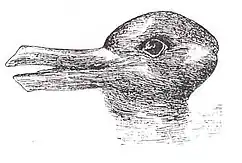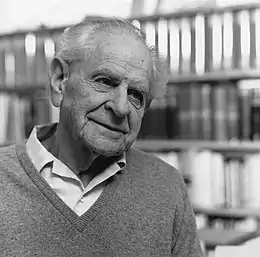Kuhn–Popper debate
The Kuhn–Popper debate was a philosophical debate about research methodologies and the growth of knowledge that happened over a series of essays during the 1965 International Colloquium in the Philosophy of Science at the University of London. The debate had three major areas of contention: the existence of a scientific method, the specific actions and practices of scientists, and the differentiation between scientific knowledge and other forms of knowledge. Initially sparked by a disagreement about the role of the normal scientist, Thomas Kuhn and Karl Popper both had equally valid arguments: one prescriptive, and one realistic. Thomas Kuhn proposed a sociological model of normal science and revolutionary science to represent how research progresses under paradigms and paradigm shifts, a model that Karl Popper rejected for its deterministic implications. Popper instead proposed that science should aim to follow the hypothetico-deductive model at all times, contending that 'normality' should never be an accepted standard for scientific research.[1] This counter-proposal sparked the debate.
Background

Thomas Kuhn
Thomas Kuhn (1922–1996) was born into a world of technological and scientific advancement. Working as a historian and philosopher of science at MIT, Kuhn published The Structure of Scientific Revolutions in 1962, proposing a theory for classifying generational knowledge under frameworks known as paradigms.[2] Paradigms being, “an accepted model or pattern,”[3] when upturned, “what were ducks in the scientist’s world before the revolution are rabbits afterwards."[4]
Karl Popper

Karl Popper (1902–1994) was born into a world of dogmatism and ideology amidst totalitarianism and WW2. As a Jew at the University of Vienna, Popper had fled to New Zealand taking up professorship at the University of Canterbury.[5] Here, he had begun to write The Poverty of Historicism (1957) and The Open Society and Its Enemies (1945) the day the Nazis stormed Austria.[6] Both works are critical analyses of methodologies within the social sciences.[7] However beyond the social sciences, Popper was also a physicist who lived amidst the second quantum revolution. Such a time proceeded through bold ideas and questions (a time which Kuhn identified as revolutionary science.)[8][9]
This background inspired Popper to produce methodological ways of knowing based upon critical rationalism, producing the concept of falsifiability. Because of Kuhn and Poppers different contexts, the two proposed starkly different theories on the growth of knowledge. However, it is recognized that the two shared similar fan bases and still agreed on most areas of contention within the sciences.[10]
Debate
Argument
Kuhn and Popper both proposed different models for how scientific research should be (and is) conducted. Kuhn saw science through sociological patterns, progressing through paradigms and paradigm shifts where it was possible for discoveries in a particular field to plateau.[11] However, Popper argued Kuhn's model was far too deterministic, instead proposing the hypothetico-deductive model, claiming that:
Science is not a system [...] which steadily advances towards a state of finality... [Science is] the method of reasoning which men now ordinarily apply to nature'—as consisting of 'anticipations, rash and premature' and as 'prejudices'.[12]
This is why Popper rejected Kuhn's acceptance of normal science, instead claiming that the regular mode of scientific inquiry should emphasize its degree of falsifiability, and in the process demarcated science from pseudo-science.[13] This is because Kuhn cared about science as a way to solve problems, and Popper cared about science as a way to solve questions with truth as an aim. Popper's model, however, was prescriptive rather than truly reflective of reality, often attacked for being too 'romantic', whereas Kuhn's was popularly accepted to have realistically portrayed scientific progression from a sociological perspective.[14][13][15]
In the end, Popper was far more idealistic, urging the scientist to work beyond their paradigm, and hold themselves to a higher standard. In opposition, Kuhn was far more pragmatic. Kuhn developed a new approach to understanding research which agreed with the history of science. Popper's argument holds sway amongst naturalists, claiming that "we become makers of our fate when we have ceased to pose as its prophets" against the deterministic nature of Kuhn's model. In contradistinction, Kuhn's argument holds footing amongst researchers in the humanities. This is because Kuhn created useful models and terminology to better understand history as thought in a time where relativism and revisionism was becoming of increasing value in academic circles.[16] The conflict was about the future of science and what standards scientists should be held to when they conduct research.
Outcome
Inquiry was central to the Kuhn–Popper debate, and while the two men were both philosophers of science, one was a historian and the other a scientist. Their backgrounds greatly influenced their perspectives. The debate never reached a true consensus; however, it represents two popular perspectives on how to treat the growth of knowledge, promoting:
- Deconstruction and recognition confirmation bias;
- Constant revision and testing;
- Using a framework to inform methodologies.[17]
Popper's argument is largely seen as the aim of research institutions and researchers, while Kuhn created a picture of what science is right now.[18]
Philosophical influences
Karl Popper's initial perspectives paid tribute to Bertrand Russel and Tarski.[19] However Popper soon diverted from these early influences, rejecting specific linguistic analyses as a means to derive deeper meanings from, favouring less-specific cases instead (finding social systems to be too complex a system to deconstruct from deductive inference.) Often Popper looked for how language was broadly used, and from there, deconstructed anti-rationalist tendencies such as historicism, and Marxism using falsifiability.[19] This approach largely removed him from the dominant Neo-Kantian tradition.[20]
Poppers philosophical doctrine is that of critical rationalism. It is dependent upon a theory for attaining knowledge with rejected causation as a viable path to knowledge due its inability to explain future events. This is inspired by Hume's problem of induction, where Hume says:
"...the supposition, that the future resembles the past, is not founded on arguments of any kind,’ but is deriv’d entirely from habit."[21]
In The Logic of Scientific Discovery Popper refuted Hume's final sentiment that nothing can be known due to the illusory nature of the world, and instead proposed a deductive model of science.[22] This model is rationalist, but critical insofar as it actively rejects inductivism.
References
- Popper, Karl (1970). Lakatos, Irme (ed.). Criticism and the Growth of Knowledge (4th ed.). Cambridge University Press. pp. 51–58. doi:10.1017/CBO9781139171434.007. ISBN 978-0-521-09623-2.
- Bird, Alexander (Spring 2022). Zalta, Edward N (ed.). Thomas Kuhn. Retrieved 2022-12-30.
{{cite encyclopedia}}:|website=ignored (help) - Kuhn, Thomas S. (2012). The Structure of Scientific Revolutions. Ian Hacking (4th ed.). The University of Chicago Press. p. 23. ISBN 978-0-226-45812-0.
- Kuhn, Thomas S. (2012). The Structure of Scientific Revolutions. Ian Hacking (4th ed.). Chicago: The University of Chicago Press. pp. 111–112. ISBN 978-0-226-45811-3. OCLC 756577696.
- Stachel, Peter (2022-12-30). Flotzinger, Rudolf; Boisits, Barbara (eds.). "Popper, Karl Raimund". Oesterreichisches Musiklexikon online. doi:10.1553/0x0001dde4. Retrieved 2022-12-30.
- "Beware of Rule by Dreamers". Haaretz. 1 August 2003. Retrieved 2022-12-30.
- Thornton, Stephan (2022-12-30). Edward N., Zalta; Nodelman, Uri (eds.). Karl Popper. Retrieved 2022-12-30.
{{cite encyclopedia}}:|website=ignored (help) - Kuhn, Thomas S. (2012). The Structure of Scientific Revolutions. Ian Hacking (4th ed.). The University of Chicago Press. p. 16. ISBN 978-0-226-45812-0.
- Kuhn, Thomas S. (2012). The Structure of Scientific Revolutions. Ian Hacking (4th ed.). The University of Chicago Press. p. 89. ISBN 978-0-226-45812-0.
- Kuhn, Thomas S. (1970). "Logic of Discovery or Psychology of Research?". In Lakatos, Irme; Musgrave, Alan (eds.). Criticism and the Growth of Knowledge. Cambridge University Press. pp. 1–24. doi:10.1017/CBO9781139171434.003. ISBN 978-0-521-09623-2.
- O'Connor, Cailin (2001-02-26). "Social Epistemology". In Zalta, Edward N. (ed.). Stanford Encyclopedia of Philosophy. Retrieved 2022-12-25.
- Popper, Karl (1959). The Logic of Scientific Discovery (2 ed.). Martino Publishing. p. 278. ISBN 978-1-61427-743-9.
- Chike, Anetoh (2021-07-12). "Karl Popper's Critique of Thomas Kuhn's Concept of Normal Science". African Journal of Social Sciences and Humanities Research. 4: 105–115. doi:10.52589/AJSSHR-NROPSRCB. S2CID 237765742 – via ResearchGate.
- Grant, Don C. (2005). "Psychoanalysis, science and the seductive theory of Karl Popper". The Australian and New Zealand Journal of Psychiatry. 39 (6): 446–452. doi:10.1080/j.1440-1614.2005.01602.x. ISSN 0004-8674. PMID 15943645. S2CID 208624045.
- Horgan, John (30 December 2022). "The Paradox of Karl Popper". Scientific American. Retrieved 30 December 2022.
- Karl, Popper (1966). "The Spell of Plato". The Open Society and its Enemies. Vol. 1–2 (5 ed.). p. 13.
- Cooksey, Ray; McDonald, Gael (2019-06-27). "Why Should I Think About Guiding Assumptions?". Surviving and Thriving in Postgraduate Research (2nd ed.). Singapore. pp. 347–304. doi:10.1007/978-981-13-7747-1. ISBN 978-981-13-7746-4. S2CID 58239658. Retrieved 2023-01-11.
{{cite book}}: CS1 maint: location missing publisher (link) - Roch, Stefen (2018). "Educating Skeptical but Passionate Citizens: The Open Society Ideal as a University Mission.". In Ignatieff, Micheal; Roch, Stefen (eds.). Rethinking Open Society. Central European University Press. pp. 47–62. ISBN 9789633862704. JSTOR 10.7829/j.ctv4cbhr8.7. Retrieved 2023-03-23.
- Hattiangadi, J. N. (1985). "The Realism of Popper and Russel". Philosophy of the Social Sciences. 15 (4): 7–8. doi:10.1177/004839318501500405. S2CID 143861006.
- Popper, K (1953). "Language and the body-mind problem: A restatement of interactionism". PhilPapers. Proceedings of the 11th International Congress of Philosophy. 7: 101–107.
- Hume, David (189). "Of the Passions". In Selby-Bigge, L.A (ed.). A Treatise of Human Nature. Vol. 3. London, Edinburgh and New York: Clarendon Press (published 1739). p. 134. Retrieved 14 February 2023 – via Liberty Fund Network.
- Popper, Karl (1934). "2". The Logic of Scientific Discovery. Martino Publishing (published 2014). p. 312. ISBN 978-1-61427-743-9.